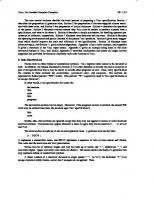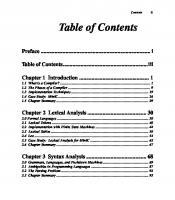Clang Compiler Frontend: Understand internals of a top-rated C/C++ compiler frontend and create your own tools [1 ed.] 9781837630981
nderstand internals of a top-rated C/C++ compiler frontend and create your own tools Clang is a compiler for C/C++ and
213 86 4MB
English Pages 382 Year 2024
Table of contents :
Preface
Who this book is for
What this book covers
To get the most out of this book
Download the example code files
Conventions used
Get in touch
Share your thoughts
Download a free PDF copy of this book
Part I: Clang Setup and Architecture
Chapter 1: Environment Setup
1.1 Technical requirements
1.1.1 CMake as project configuration tool
1.1.2 Ninja as build tool
1.2 Getting to know LLVM
1.2.1 Short LLVM history
1.2.2 OS support
1.2.3 LLVM/Clang project structure
1.3 Source code compilation
1.3.1 Configuration with CMake
1.3.2 Build
1.3.3 The LLVM debugger, its build, and usage
1.4 Test project – syntax check with a Clang tool
1.5 Summary
1.6 Further reading
Chapter 2: Clang Architecture
2.1 Technical requirements
2.2 Getting started with compilers
2.2.1 Exploring the compiler workflow
2.2.2 Frontend
2.3 Clang driver overview
2.3.1 Example program
2.3.2 Compilation phases
2.3.3 Tool execution
2.3.4 Combining it all together
2.3.5 Debugging Clang
2.4 Clang frontend overview
2.4.1 Frontend action
2.4.2 Preprocessor
2.4.3 Parser and sema
2.5 Summary
2.6 Further reading
Chapter 3: Clang AST
3.1 Technical requirements
3.2 AST
3.2.1 Statements
3.2.2 Declarations
3.2.3 Types
3.3 AST traversal
3.3.1 DeclVisitor test tool
3.3.2 Visitor implementation
3.4 Recursive AST visitor
3.5 AST matchers
3.6 Explore Clang AST with clang-query
3.7 Processing AST in the case of errors
3.8 Summary
3.9 Further reading
Chapter 4: Basic Libraries and Tools
4.1 Technical requirements
4.2 LLVM coding style
4.3 LLVM basic libraries
4.3.1 RTTI replacement and cast operators
4.3.2 Containers
4.3.3 Smart pointers
4.4 Clang basic libraries
4.4.1 SourceManager and SourceLocation
4.4.2 Diagnostics support
4.5 LLVM supporting tools
4.5.1 TableGen
4.5.2 LLVM test framework
4.6 Clang plugin project
4.6.1 Environment setup
4.6.2 CMake build configuration for plugin
4.6.3 Recursive visitor class
4.6.4 Plugin AST consumer class
4.6.5 Plugin AST action class
4.6.6 Plugin code
4.6.7 Building and running plugin code
4.6.8 LIT tests for clang plugin
4.7 Summary
4.8 Further reading
Part II: Clang Tools
Chapter 5: Clang-Tidy Linter Framework
5.1 Technical requirements
5.2 Overview of Clang-Tidy and usage examples
5.2.1 Building and testing Clang-Tidy
5.2.2 Clang-Tidy usage
5.2.3 Clang-Tidy checks
5.3 Clang-Tidy’s internal design
5.3.1 Internal organization
5.3.2 Configuration and integration
5.4 Custom Clang-Tidy check
5.4.1 Creating a skeleton for the check
5.4.2 Clang-Tidy check implementation
5.4.3 LIT test
5.4.4 Results in the case of compilation errors
5.4.5 Compilation errors as edge cases
5.5 Summary
5.6 Further reading
Chapter 6: Advanced Code Analysis
6.1 Technical requirements
6.2 Static analysis
6.3 CFG
6.4 Custom CFG check
6.4.1 Creating the project skeleton
6.4.2 Check implementation
6.4.3 Building and testing the cyclomatic complexity check
6.5 CFG on Clang
6.5.1 CFG construction by example
6.5.2 CFG construction implementation details
6.6 Brief description of Clang analysis tools
6.7 Knowing the limitations of analysis
6.8 Summary
6.9 Future reading
Chapter 7: Refactoring Tools
7.1 Technical requirements
7.2 Custom code modification tool
7.2.1 Code modification support at Clang
7.2.2 Test class
7.2.3 Visitor class implementation
7.2.4 Consumer class implementation
7.2.5 Build configuration and main function
7.2.6 Running the code modification tool
7.3 Clang-Tidy as a code modification tool
7.3.1 FixItHint
7.3.2 Creating project skeleton
7.3.3 Check implementation
7.3.4 Build and run the check
7.4 Code modification and Clang-Format
7.4.1 Clang-Format configuration and usage examples
7.4.2 Design considerations
7.4.3 Clang-Tidy and Clang-Format
7.5 Summary
7.6 Further reading
Chapter 8: IDE Support and Clangd
8.1 Technical requirements
8.2 Language Server Protocol
8.3 Environment setup
8.3.1 Clangd build
8.3.2 VS Code installation and setup
8.4 LSP demo
8.4.1 Demo description
8.4.2 LSP session
8.5 Integration with Clang tools
8.5.1 Clangd support for code formatting using LSP messages
8.5.2 Clang-Tidy
8.6 Performance optimizations
8.6.1 Optimizations for modified documents
8.6.2 Building preamble optimization
8.7 Summary
8.8 Further reading
Part III: Appendix
Appendix 1: Compilation Database
9.1 Compilation database definition
9.2 CDB creation
9.3 Clang tools and a CDB
9.4 Further reading
Appendix 2: Build Speed Optimization
10.1 Technical requirements
10.2 Precompiled headers
10.3 Clang modules
10.4 Further reading
Bibliography
Index
Why subscribe?
Other Books You Might Enjoy
Packt is searching for authors like you
Share your thoughts
Download a free PDF copy of this book
Preface
Who this book is for
What this book covers
To get the most out of this book
Download the example code files
Conventions used
Get in touch
Share your thoughts
Download a free PDF copy of this book
Part I: Clang Setup and Architecture
Chapter 1: Environment Setup
1.1 Technical requirements
1.1.1 CMake as project configuration tool
1.1.2 Ninja as build tool
1.2 Getting to know LLVM
1.2.1 Short LLVM history
1.2.2 OS support
1.2.3 LLVM/Clang project structure
1.3 Source code compilation
1.3.1 Configuration with CMake
1.3.2 Build
1.3.3 The LLVM debugger, its build, and usage
1.4 Test project – syntax check with a Clang tool
1.5 Summary
1.6 Further reading
Chapter 2: Clang Architecture
2.1 Technical requirements
2.2 Getting started with compilers
2.2.1 Exploring the compiler workflow
2.2.2 Frontend
2.3 Clang driver overview
2.3.1 Example program
2.3.2 Compilation phases
2.3.3 Tool execution
2.3.4 Combining it all together
2.3.5 Debugging Clang
2.4 Clang frontend overview
2.4.1 Frontend action
2.4.2 Preprocessor
2.4.3 Parser and sema
2.5 Summary
2.6 Further reading
Chapter 3: Clang AST
3.1 Technical requirements
3.2 AST
3.2.1 Statements
3.2.2 Declarations
3.2.3 Types
3.3 AST traversal
3.3.1 DeclVisitor test tool
3.3.2 Visitor implementation
3.4 Recursive AST visitor
3.5 AST matchers
3.6 Explore Clang AST with clang-query
3.7 Processing AST in the case of errors
3.8 Summary
3.9 Further reading
Chapter 4: Basic Libraries and Tools
4.1 Technical requirements
4.2 LLVM coding style
4.3 LLVM basic libraries
4.3.1 RTTI replacement and cast operators
4.3.2 Containers
4.3.3 Smart pointers
4.4 Clang basic libraries
4.4.1 SourceManager and SourceLocation
4.4.2 Diagnostics support
4.5 LLVM supporting tools
4.5.1 TableGen
4.5.2 LLVM test framework
4.6 Clang plugin project
4.6.1 Environment setup
4.6.2 CMake build configuration for plugin
4.6.3 Recursive visitor class
4.6.4 Plugin AST consumer class
4.6.5 Plugin AST action class
4.6.6 Plugin code
4.6.7 Building and running plugin code
4.6.8 LIT tests for clang plugin
4.7 Summary
4.8 Further reading
Part II: Clang Tools
Chapter 5: Clang-Tidy Linter Framework
5.1 Technical requirements
5.2 Overview of Clang-Tidy and usage examples
5.2.1 Building and testing Clang-Tidy
5.2.2 Clang-Tidy usage
5.2.3 Clang-Tidy checks
5.3 Clang-Tidy’s internal design
5.3.1 Internal organization
5.3.2 Configuration and integration
5.4 Custom Clang-Tidy check
5.4.1 Creating a skeleton for the check
5.4.2 Clang-Tidy check implementation
5.4.3 LIT test
5.4.4 Results in the case of compilation errors
5.4.5 Compilation errors as edge cases
5.5 Summary
5.6 Further reading
Chapter 6: Advanced Code Analysis
6.1 Technical requirements
6.2 Static analysis
6.3 CFG
6.4 Custom CFG check
6.4.1 Creating the project skeleton
6.4.2 Check implementation
6.4.3 Building and testing the cyclomatic complexity check
6.5 CFG on Clang
6.5.1 CFG construction by example
6.5.2 CFG construction implementation details
6.6 Brief description of Clang analysis tools
6.7 Knowing the limitations of analysis
6.8 Summary
6.9 Future reading
Chapter 7: Refactoring Tools
7.1 Technical requirements
7.2 Custom code modification tool
7.2.1 Code modification support at Clang
7.2.2 Test class
7.2.3 Visitor class implementation
7.2.4 Consumer class implementation
7.2.5 Build configuration and main function
7.2.6 Running the code modification tool
7.3 Clang-Tidy as a code modification tool
7.3.1 FixItHint
7.3.2 Creating project skeleton
7.3.3 Check implementation
7.3.4 Build and run the check
7.4 Code modification and Clang-Format
7.4.1 Clang-Format configuration and usage examples
7.4.2 Design considerations
7.4.3 Clang-Tidy and Clang-Format
7.5 Summary
7.6 Further reading
Chapter 8: IDE Support and Clangd
8.1 Technical requirements
8.2 Language Server Protocol
8.3 Environment setup
8.3.1 Clangd build
8.3.2 VS Code installation and setup
8.4 LSP demo
8.4.1 Demo description
8.4.2 LSP session
8.5 Integration with Clang tools
8.5.1 Clangd support for code formatting using LSP messages
8.5.2 Clang-Tidy
8.6 Performance optimizations
8.6.1 Optimizations for modified documents
8.6.2 Building preamble optimization
8.7 Summary
8.8 Further reading
Part III: Appendix
Appendix 1: Compilation Database
9.1 Compilation database definition
9.2 CDB creation
9.3 Clang tools and a CDB
9.4 Further reading
Appendix 2: Build Speed Optimization
10.1 Technical requirements
10.2 Precompiled headers
10.3 Clang modules
10.4 Further reading
Bibliography
Index
Why subscribe?
Other Books You Might Enjoy
Packt is searching for authors like you
Share your thoughts
Download a free PDF copy of this book
![Clang Compiler Frontend: Understand internals of a top-rated C/C++ compiler frontend and create your own tools [1 ed.]
9781837630981](https://ebin.pub/img/200x200/clang-compiler-frontend-understand-internals-of-a-top-rated-c-c-compiler-frontend-and-create-your-own-tools-1nbsped-9781837630981.jpg)
![Clang Compiler Frontend: Get to grips with the internals of a C/C++ compiler frontend and create your own tools [1 ed.]
1837630984, 9781837630981](https://ebin.pub/img/200x200/clang-compiler-frontend-get-to-grips-with-the-internals-of-a-c-c-compiler-frontend-and-create-your-own-tools-1nbsped-1837630984-9781837630981.jpg)
![Clang Compiler Frontend: Get to grips with the internals of a C/C++ compiler frontend and create your own tools [1 ed.]
1837630984, 9781837630981](https://ebin.pub/img/200x200/clang-compiler-frontend-get-to-grips-with-the-internals-of-a-c-c-compiler-frontend-and-create-your-own-tools-1nbsped-1837630984-9781837630981-p-2352417.jpg)



![Build Your Own .NET Language and Compiler [1 ed.]
1590591348, 9781590591345](https://ebin.pub/img/200x200/build-your-own-net-language-and-compiler-1nbsped-1590591348-9781590591345.jpg)



